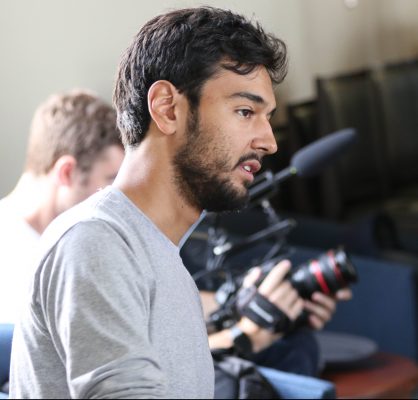Written by Samantha Peng
Mar. 20, 2019
Whether you’re already a member or you’re thinking of joining the Emerging Media Lab, you could learn a thing or two from some of our longtime members.
William Beltran and Michael Goh are both full-time undergraduate students and EML developers who started their journey at the lab as volunteers and now work as work-learns.
Here are some things current or prospective members should know about working at EML.
1. Skills and abilities of all levels are welcome.
Michael: “It’s not required [to have developing or designing skills], so some volunteers may come in and say they’ve been working with Unity for two-to-three years now, which is amazing but it’s not something that’s expected of them.”
After volunteers are hired and orientations are completed, workshops and guided tutorials are provided to members to ease the learning curve.
And as a Technical Lead (the lead developer in a team), Michael assesses the skill levels of his team members and recommends readings or tutorials for each member.
2. “It’s okay not to know something and ask a lot of questions.”
Because EML is an experimental space for students that emphasizes the importance of learning and asking for help when needed.
William: “I have a very hard time asking for help because I want to be like ‘I solved it!’, but that’s silly. You learn way more when you engage with the people you’re working with.”
William suggests asking EML industry experts at the lab for help. He says that EML members have a lot of knowledge to share and they enjoy talking about anything related to emerging media experiences.
3. Your opinion about a project matters.
Michael: “I like the freedom we have that some places probably wouldn’t give, like being able to make big decisions on projects or working with a principal investigator [or client] directly.”
Michael says that discussing the realistic expectations of a project or saying ‘no’ to a client, faculty or staff member are skills that lots of students don’t have.
By working at EML, he has developed the ability to receive specifications from a PI/client and bring their ideas to life, but not without discussing both the limitations and possibilities given a certain timeline and certain resources.
4. Working at EML is flexible.
William: “I prioritize school work first.”
As a work-learn, William commits 10 hours to his position per week. But when he has finals he won’t come in for work at all. The EML prioritizes all members’ academic commitments before its own.
According to Michael, volunteers put in around five hours per week, but are welcome to contribute more or fewer hours depending on their circumstances.
Members are required to attend team meetings and they have the option to come to EML-wide weekly check-ins. They work on their assigned project for the rest of their hours.
5. The Emerging Media Lab is an open and welcoming community.
Michael has watched EML grow from a start-up to what it has become today.
Michael: “Now that EML is bigger there are a lot more people coming in and out. We’re able to interact with people of different backgrounds, not just comp-sci students.”
William: “And it’s incredibly refreshing to be in a space where people are comfortable talking to each other. We’re all, for the most part, interested in the same things, so it’s just a nice community and that’s awesome to have.”
6. You will learn how to work with people of all backgrounds.
William: “A good team looks like, a bit cliche, but plenty of communication.”
William has learned how to work in a team, how to communicate well, and how to complete a project with proper planning. It also helps when team members are passionate about the same project, working hard to finish their component of a project to the best of their abilities.
“If you’re working on something that you consider important you’re gonna put a lot of work into it. The final project looks good when everybody is excited and aware of the importance that each piece of the project they’re working on holds.”
7. You will gain confidence to work within a development team.
William: “My biggest takeaway from EML is that my technical skills have gotten better. I feel like I could go into the workplace and know how a team functions. And maybe even be in a bigger leadership position. So that’s what I’ve earned from EML.”
EML provides a diverse network of support, from faculty members, to staff, to industry experts, and to other talented student members.
Members are taught how to start and finish projects using industry standard methods, tools, and frameworks. EML provides a peek into what a career in emerging technologies could look like.
8. But also, BE CONFIDENT!
Michael: “Be confident in your skills, you were hired [as a member] because they saw something special in you.”
Whether it’s your creativity, ability to problem solve or proficiency with Unity, the EML sees you as a valuable member of the lab.
“Don’t be afraid to question authority a little bit. Sometimes you have to raise questions for the benefit of a project.”
Michael says you can’t say ‘yes’ to everything your client/PI asks for. You have to learn how to say ‘this is not a priority, we acknowledge your request is something nice to have, but only if our time and resources permit’.
Be confident in your ability to discern what is a priority.
9. Show your commitment by showing up often.
William: “Don’t slack off just because it’s a volunteer position because you can do a lot of favours for yourself and even for the lab. If you’re going to work at EML, just commit to it.”
William started at EML as a volunteer, but because he showed up often, worked enthusiastically on projects, and is a good team player, EML hired him as a work-learn the following term.
Come to optional check-in meetings, Friday socials and complete your hours in the lab. The more student, staff and faculty members see you, the more opportunities you have to network, learn and take on new and interesting experiences.
10. “Be willing and be ready to teach as many people as possible that come in.”
Michael: “Be ready to teach people, whether they’re a work-learn or a volunteer who has no idea what’s going on.”
Working on projects that involve emerging technologies can be overwhelming. Sometimes, it can be intimidating to ask someone for help, and that’s how students help out one another.
Michael finds it easier to teach a fellow student member as a student who had to learn how to develop VR projects from scratch. Since he understands the challenges new members face, he’s better able to guide them.
“There are always new people who started where I was, where I had no idea what I was doing. Why not provide them with support so that they learn much faster than I did.”
Want to become a member?
To find out more, check out our website, fill out this form, come to our drop-ins, or send an email to emergingmedia.lab@ubc.ca.

Developer Michael Goh.

Developer William Beltran.